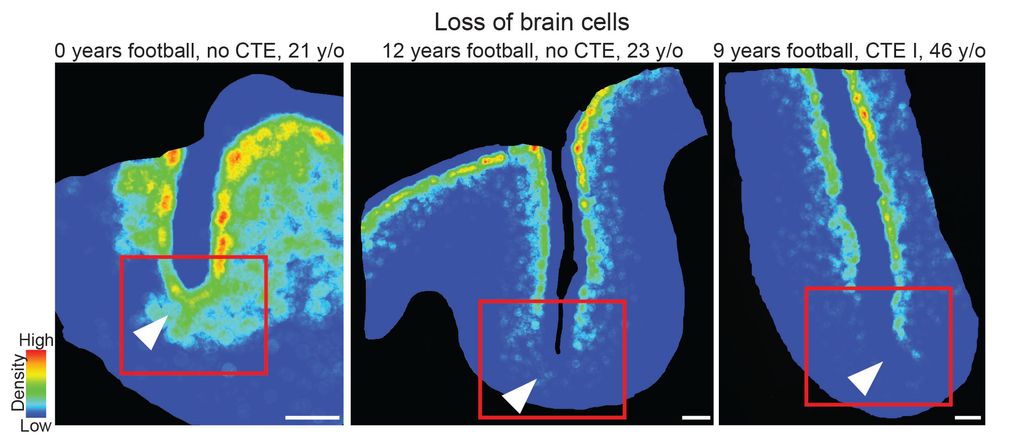BU Study of Young Athletes Finds Neurodegeneration Might Begin Before CTE
Photo by Shawn Day on Unsplash
CTE
BU Study of Young Athletes Finds Neurodegeneration Might Begin Before CTE
These results have the potential to significantly change our perspective on contact sports.
This fall, tens of millions of people will be at risk for chronic traumatic encephalopathy (CTE), a degenerative brain disease caused by repeated head impacts from contact sports like football, soccer, and ice hockey, or military service. Researchers have long suspected that the brain begins changing years before CTE appears, but proof has been elusive because CTE can only be definitively diagnosed after death.
A new study led by researchers from Boston University Chobanian & Avedisian School of Medicine, published in Nature, has revealed a cascade of “repetitive head impact (RHI)-related brain injuries” resulting in brain cell loss, inflammation and vascular damage in young former contact sport athletes. Importantly, many of the changes were seen in athletes before the onset of CTE.
 Jonathan Cherry, PhD
Jonathan Cherry, PhD“These results have the potential to significantly change how we view contact sports. They suggest that exposure to RHI can kill brain cells and cause long-term brain damage, independent of CTE,” said corresponding author Jonathan Cherry, PhD, assistant professor of pathology & laboratory medicine and director of the digital pathology core at the BU CTE Center.
To identify the earliest changes from RHI, researchers performed single nucleus RNA sequencing on the frozen human brain tissue from 28 men between the ages of 25 and 51. They were divided into three groups: a control group of eight men who didn’t play contact sports; an RHI group comprised of eight American football players and a soccer player, none of whom were diagnosed with CTE; and a CTE group of 11 contact-sport athletes with low-stage (defined as Stage 1 or 2) CTE. All results were further validated and confirmed in larger sample sets and through comparison to other published studies.
As previously published, athletes diagnosed with low-stage CTE had significant inflammatory and vascular changes. However, this study showed similar levels of vascular injury and inflammation in athletes without CTE, suggesting that RHI-related brain injury is not solely dependent on CTE.
 Image provided by Morgane Butler, PhD.
Image provided by Morgane Butler, PhD.
One of the most striking findings was a 56% loss of neurons, cells vital to normal brain function, in young athletes participating in contact sports. The loss of neurons was precisely at the cortical sulcal depths, the brain regions that undergo the highest mechanical forces during head impact injury, and where CTE first develops. Neuron loss was observed in all athletes, regardless of whether they had CTE.
“You don’t expect to see neuron loss or inflammation in the brains of young athletes because they are generally free of disease. These findings suggest that repetitive head impacts cause brain injury much earlier than we previously thought,” said Cherry. “The risk for CTE is directly related to repetitive head impact exposure in contact sports. These results highlight that even athletes without CTE can have substantial brain injury. Understanding how these changes occur, and how to detect them during life, will help the development of better prevention strategies and treatments to protect young athletes.”
 Ann McKee, MD
Ann McKee, MD“This groundbreaking study shows that repetitive hits to the head, including concussions and the more frequent non-concussive impacts, cause brain damage in young people even before CTE. These findings should serve as a call to reduce head hits in contact sports at all levels, including youth, high school and college,” adds coauthor Ann McKee, MD, director of the BU CTE Center and William Fairfield Warren Distinguished Professor of Neurology and Pathology at BU.
About the BU CTE Center
The BU CTE Center is an independent academic research center at the Boston University Avedisian & Chobanian School of Medicine. It conducts pathological, clinical and molecular research on CTE and other long-term consequences of repetitive brain trauma in athletes and military personnel. For people considering brain donation, click here. To support its research, click here.